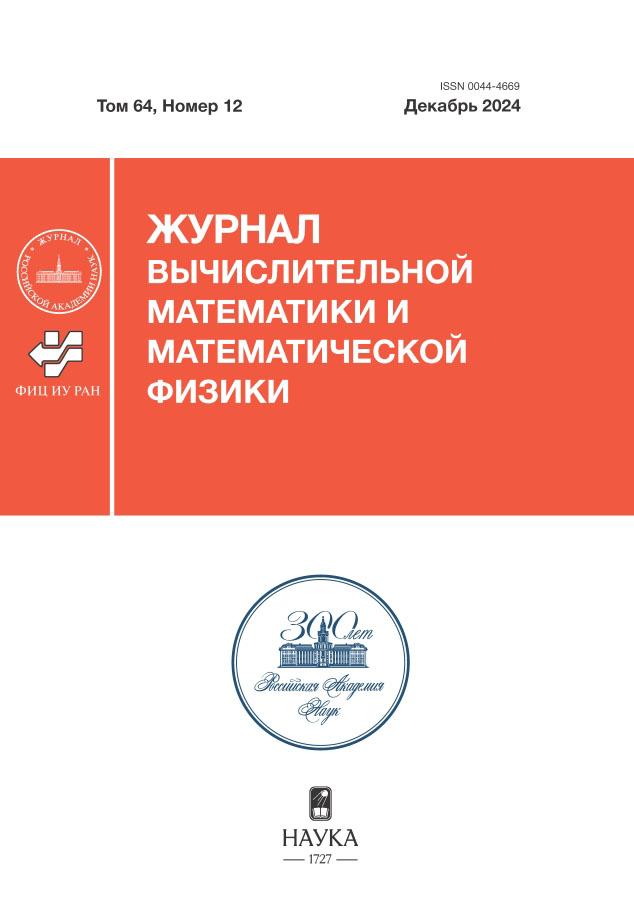FAST CALCULATION OF INTEGRAL CONVOLUTION TYPE OPERATORS IN OPTION ESTIMATION PROBLEMS IN LEVY MODELS
- Авторлар: Grechko A.S.1, Kudryavtsev O.E.1,2
-
Мекемелер:
- Yeremenko 58/11, Research and production company “InWise Systems” LLC
- Rostov branch of the Russian Customs Academy
- Шығарылым: Том 64, № 12 (2024)
- Беттер: 2243–2261
- Бөлім: General numerical methods
- URL: https://cijournal.ru/0044-4669/article/view/669675
- DOI: https://doi.org/10.31857/S0044466924120027
- EDN: https://elibrary.ru/KCYGDV
- ID: 669675
Дәйексөз келтіру
Аннотация
An approximate algorithm for calculating integral operators of the convolution type that arise when evaluating barrier options in Levy models by the Wiener–Hopf method is constructed. Additionally, the question of the possibility of applying machine learning methods (artificial neural networks) to the approximation of a special type of integrals, which are a key element in the construction of approximate formulas for the Wiener–Hopf integral operators under consideration, is investigated. The main idea is to decompose the price function into a Fourier series and transform the integration contour for each term of the Fourier series. As a result, we obtain a set of typical integrals that depend on Wiener–Hopf factors, but do not depend on the price function, while the most computationally expensive part of the numerical method is reduced to calculating these integrals. Since they need to be calculated only once, and not at each iteration, as was the case in standard implementations of the Wiener–Hopf method, this will significantly speed up calculations. Moreover, a neural network can be trained to calculate typical integrals. The proposed approach is especially effective for spectrally one-sided Levy processes, for which explicit Wiener–Hopf factorization formulas are known. In this case, we obtain computationally convenient formulas by integrating along the section. The main advantage of including neural networks in a computational scheme is the ability to perform calculations on an uneven grid. Such a hybrid numerical method will be able to successfully compete with classical methods of computing convolutions in similar tasks using the fastFourier transform. Computational experiments show that neural networks with one hidden layer of 20 neurons are able to effectively cope with the tasks of approximating the auxiliary integrals under consideration.
Авторлар туралы
A. Grechko
Yeremenko 58/11, Research and production company “InWise Systems” LLC
Email: koe@sfedu.ru
Rostov-on-Don, Russia
O. Kudryavtsev
Yeremenko 58/11, Research and production company “InWise Systems” LLC; Rostov branch of the Russian Customs Academy
Email: alex@itparadigma.ru
Rostov-on-Don, Russia; Rostov-on-Don, Russia
Әдебиет тізімі
- Кудрявцев О.Е. Эффективный численный метод решения специального класса интегро-дифференциальных уравнений, связанных с моделями Леви // Матем. моделирование. 2011. Т. 23. № 5. С. 95-104.
- Кудрявцев О.Е. Приближенная факторизация Винера—Хопфа и метод Монте-Карло для процессов Леви // Теория вероятностей и ее применения. 2019. Т 64. № 2. С. 228—257.
- Кудрявцев О.Е., Гречко А.С., Мамедов И.Э. Метод Монте-Карло для вычисления цен опционов типа lookback в моделях Леви // Теория вероятностей и ее применения. 2024. Т. 69. № 2. С. 305—334.
- Ширяев А.Н. Основы стохастической финансовой математики. Факты. Модели. М.: Фазис, 1998. Т. 1.440 с.
- Boyarchenko S.I., Levendorskii S.Z. Non-Gaussian Merton-Black-Scholes theory. New Jercey, London, Singapore, Hong Kong: World Sci., 2002, 420 p.
- Boyarchenko M., Levendorskii S. Valuation of continuously monitored double barrier options and related securities // Math Financ. (2011) doi: 10.1111/j.1467-9965.2010.00469.x
- Dixon M.F., Halperin I., Bilokon P. Machine Learning in Finance: From Theory to Practice. Germany: Springer Inter. Publ., 2020.
- CarrP, Geman H., Madan D.B., YorM. The fine structure of asset returns: an empirical investigation //J. Business. 2002. V. 75. № 2. P. 305-332.
- Cont R., Voltchkova E. A finite difference scheme for option pricing in jump diffusion and exponential Levy models // SIAM J. Numer. Analys. 2005. V 43. № 4. P. 1596-1626.
- Cont R., Tankov P. Financial modelling with jump processes, 2nd Ed., Chapman & Hall/CRC Press, 2008. 606 p.
- Cybenko G. Approximation by superpositions of a sigmoidal function, Mathematics of Control, Signals and Systems. 1989. 2. Р. 303-314.
- Goudeniege L., MolentA., Zanette A. Machine learning for pricing American options in high-dimensional Markovian and non-Markovian models // Quantitative Finance. 2020. V. 20. № 4. P. 573-591.
- Hornik K. Approximation capabilities of multilayer feedforward networks // Neural Networks. 1991. V 4. № 2. P. 251-257.
- Huh J. Pricing Options with Exponential Levy Neural Network // Expert Systems with Appl. 2019. V. 127. doi: 10.1016/j.eswa.2019.03.008
- Itkin A. Pricing Derivatives Under Levy Models: book, Birkhauser, 2017. 308 p.
- Kirkby J.L. Robust barrier option pricing by frame projection under exponential Levy dynamics // Appl. Math. Finance. 2017. V 24. № 4. P. 337-386.
- Kudryavtsev O. Levendorskii S. Fast and accurate pricing of barrier options under Levy processes // Finance Stoch. 2009. V. 13. №4. P. 531-562.
- Kudryavtsev O., Luzhetskaya P. The Wiener-Hopf Factorization for Pricing Options Made Easy // Engineer. Lett. 2020. V. 28. № 4. P. 1310-1317.
- Kudryavtsev O., Zanette A. Applications of Levy Processes // Math. Res. Developments, NY: Nova Science Publishers, Incorporated, 2021. ISBN: 978-1-53619-525 -5
- Kudryavtsev O. A simple Wiener-Hopf factorization approach for pricing double-barrier options. In: Karapetyants A.N., Pavlov I.V., Shiryaev A.N. (Ed.) Operator Theory and Harmonic Analysis. OTHA2020. Springer Proceedings in Mathematics & Statistics, Springer, Cham, 2021. V 358, pp. 273-291.
- Kudryavtsev O. A simplified Wiener-Hopf factorization method for pricing double barrier options under Levy processes // Comput. Manag. Sci. 2024. V 21. P 37.
- Kudryavtsev O., Danilova N. Applications of artificial neural networks to simulating Levy processes //J. Math. Sci. 2023. V. 271. № 4. P. 421-433.
- Kyprianou A.E. Introductory Lectures on Fluctuations of Levy Processes with Applications, 2006, Springer, Berlin.
- Phelan E., Marazzina D., Fusai G., and Germano G. Fluctuation identities with continuous monitoring and their application to price barrier options // Europ. J. Operat. Res. 2018. V 271. № 1. P 210-223.
- Sato K. Levy processes and infinitely divisible distributions. Cambridge: Cambridge Univ. Press, 1999. 486 p.
Қосымша файлдар









